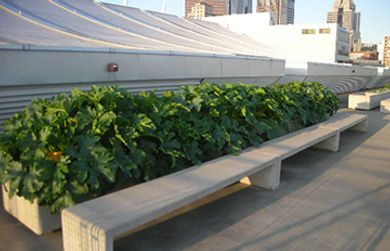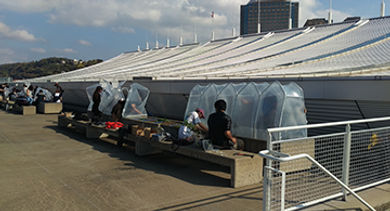The first few breaths of spring are on the horizon, which means a new growing season soon will begin on the roof of the David L. Lawrence Convention Center in Pittsburgh. The facility, which has long been a vanguard in the sustainable-meetings world, has 46 rooftop garden boxes, spanning length of the facility along the Allegheny River.

"When they were first planted, they held native plants," says Tom Bugel, right, the center's director of cafe and restaurant services, of the 2-foot by 8-foot boxes. "But I saw that they could be used to plant what we needed in the kitchen."
To help extend the growing season on the roof, the facility has partnered with Carnegie Mellon University on a project to build "hoop houses," covers for the boxes that keep the plants warm and producing. "A professor from CMU was here talking to the staff about a renovation, and he noticed the garden," says Bugel. "He had a class that was working on hoop houses at various gardens, but never had a place where the whole class could work together."

Last year, 55 architecture students studying agriculture in post-industrial cities and six of their professors were charged with creating hoop houses for Bugel using simple materials: steel conduit and a greenhouse plastic that can be heat-shrunk to the steel frames. Each student team was responsible for its own concept, design and installation. Ten hoop houses were created, and Bugel kept four. "They're built so well, we'll probably get eight to 10 years out of them," he says. "Everyone did a really great job on the project. Next fall, we'll get another class out here."
Planning which fruit, vegetables and herbs will go in the boxes this year will begin in February, and Bugel figures, with the new hoop houses, he can start planting in March, a little earlier than usual. The center ends up using 1,000 to 2,000 pounds of food from the roof, depending on what ends up thriving each year. Last year, 300 pounds of eggplants were picked.

The garden also is used to help one winged population. "Three years ago we took some of the boxes and did a butterfly way station, planting local milkweed," says Bugel. "That project is still happening now with the Audubon Society."
Only heirloom seeds are used in the garden, and once the plants are played out for the year, their seeds are harvested. "We let some plants go to full term so we can collect them," Bugel says.
The facility is proud of the garden and hosts events on the roof. "We've done parties of up to 2,000 people up there, spanning the two blocks of the convention center on the river side," Bugel notes. "We also encourage locals to pick some of the produce."
The convention center is one of the greenest in the country, currently holding both Gold LEED certification (for new buildings) and Platinum certification (for existing buildings). The catering department buys local fare 32.6 percent of the time, eco-friendly chemicals are used 87 percent of the time, all paper products in the offices now are fully compostable, and workers sort through every bag of garbage filled at the venue to separate out compostables and recyclables. All organic waste is composted, and some of the organic matter is used to fertilize the rooftop garden's soil.
Adds Bugel: "Sustainability is a part of every day here."
To read more about the David L. Lawrence Convention Center's sustainability efforts, click here.
Photographs courtesy of Levy Restaurants